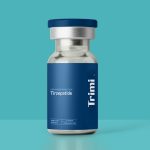Explore how glutathione and vitamin C may fit into your personal wellness plan. Learn the differences, benefits, and when to speak with a licensed provider.
Key Highlights
- Glutathione helps support antioxidant activity and cell function. Many people include it in skincare and detox-focused wellness plans.
- Vitamin C supports skin health, collagen production, and immune function.
- Some individuals combine both for a more holistic antioxidant routine—with guidance from healthcare professionals.
- These nutrients come in various forms: oral, topical, or IV—each offering different benefits.
- TryTrimi connects you with licensed providers to explore these options safely and effectively.
Glutathione and vitamin C are two of the most well-known antioxidants used in wellness and skincare. Found in supplements, beauty products, and IV drips, both are known for their roles in skin appearance, immune support, and overall health.
But how do they compare? Should you choose one—or both?
Let’s take a closer, fact-based look.
What Is Glutathione?
Glutathione is a powerful antioxidant your body naturally produces in the liver. It’s made of three amino acids—cysteine, glutamic acid, and glycine—and helps fight free radicals, keeping cells functioning properly.
Why It’s Popular
People turn to glutathione in supplement or IV form to support:
- More even-looking skin
- Reduced appearance of dullness
- The body’s natural detox system
- General well-being during times of stress
It’s important to note that glutathione is not FDA-approved for treating skin issues. Any reported skin benefits are based on personal experiences and should be discussed with a healthcare provider—especially if considering high doses or injections.
What Is Vitamin C?
Vitamin C, also called ascorbic acid, is an essential nutrient. Since your body doesn’t make it on its own, it must be consumed through food or supplements.
It plays a key role in:
- Collagen production (for skin and tissue strength)
- Iron absorption
- Supporting the immune system
What It May Help With
Vitamin C is widely used in:
- Brightening skin tone
- Reducing visible dullness
- Supporting collagen and elasticity
- Boosting the immune system
It’s available in both oral and topical forms, and some people opt for IV therapy under medical guidance. As with any supplement, speak with a licensed provider before starting.
Glutathione vs. Vitamin C: Skin and Wellness Roles
Glutathione’s Role in Appearance & Wellness
Glutathione is often added to wellness plans aimed at improving how skin looks and feels. It may help the body manage oxidative stress, which can affect the skin and energy levels.
People use it for:
- Skin affected by environmental pollution
- Uneven skin tone or dull complexion
- Recovery after sun exposure or travel
Note: Glutathione is not approved for treating pigmentation or skin conditions. Its use should always be guided by a licensed provider.
Vitamin C’s Role in Skin & Health
Vitamin C has been thoroughly researched for its role in skin strength and appearance. It supports collagen production and may help skin recover from sun damage and signs of aging.
People often use it to:
- Improve firmness and elasticity
- Brighten their skin
- Reduce the look of sun exposure over time
Topical products and supplements are both common forms. Again, it’s best to speak with a professional before starting.
Immune System Support: A Comparison
Glutathione and Immunity
Glutathione helps the immune system function properly by aiding in the regeneration of other antioxidants. It also helps manage the balance between inflammation and immune response.
Low glutathione levels—caused by stress, aging, poor nutrition, or toxins—may reduce the body’s ability to respond to illness. Some people supplement it when under increased stress, though more research is needed in general populations.
Vitamin C and Immunity
Vitamin C is a top choice for immune health. It supports white blood cell activity and helps protect cells from oxidative stress.
It’s ideal for people looking to strengthen their everyday immune defense, especially during periods of physical or seasonal stress.
Which One Should You Choose?
Here’s a quick comparison to help guide your decision:
| Goal | Glutathione Might Help If… | Vitamin C Might Help If… |
|---|---|---|
| Skin Glow | You want to support skin tone from within | You want to boost collagen and skin brightness |
| Immune Support | You’re under high stress or toxin exposure | You want regular immune system support |
| Detox | You’re targeting antioxidant balance | Not typically used for detox |
| Healthy Aging | You want antioxidant support with age | You’re focused on firm, healthy skin |
Can You Use Both Together?
Yes—many people include both in their wellness plan, as they work in complementary ways.
However, always check with a healthcare provider before starting both together—especially if you’re considering IV therapy or high-dose versions.
TryTrimi helps connect you with trusted professionals who can guide you in building a custom antioxidant routine that fits your body and goals.
Forms of Use: Oral, IV, or Topical?
Glutathione
- Oral: Easy to take, but absorption may vary
- IV: Fast-acting and direct, but requires medical supervision
- Topical: Found in some creams, but results are usually mild and localized
Vitamin C
- Oral: Most common and great for immune support
- IV: Used in certain wellness or medical settings
- Topical: Effective in skincare for brightening and firming
What to Expect
Glutathione and vitamin C are not cures or substitutes for medical treatment. But when used under professional guidance, they can be valuable additions to a healthy lifestyle.
Not sure which is best for your needs? TryTrimi connects you with licensed providers who can assess your wellness goals, lifestyle, and any recent lab work before making recommendations.
Final Thoughts
Glutathione and vitamin C each bring unique strengths to your wellness journey. Whether you’re looking to boost skin health, support your immune system, or improve how you feel daily, the right choice depends on your personal goals—and your provider’s expert input.
Don’t guess your way through wellness. A licensed healthcare provider can guide you toward a plan that truly works for your body.
Start Your Wellness Journey
Ready to find out if glutathione or vitamin C is right for you?
With TryTrimi, you can connect with a licensed provider for a personalized consultation. No guesswork. Just evidence-based guidance tailored to your unique needs.
Disclaimer:
The FDA does not approve compounded medications for safety or quality. Prescriptions and proper evaluation are required. This article is for general education and not a substitute for professional advice. Always speak to a licensed healthcare provider before making medical decisions.
TryTrimi is not a pharmacy or healthcare provider. We connect users with licensed medical professionals who provide individualized evaluations. Prescriptions are written only when appropriate and filled by licensed pharmacies.





